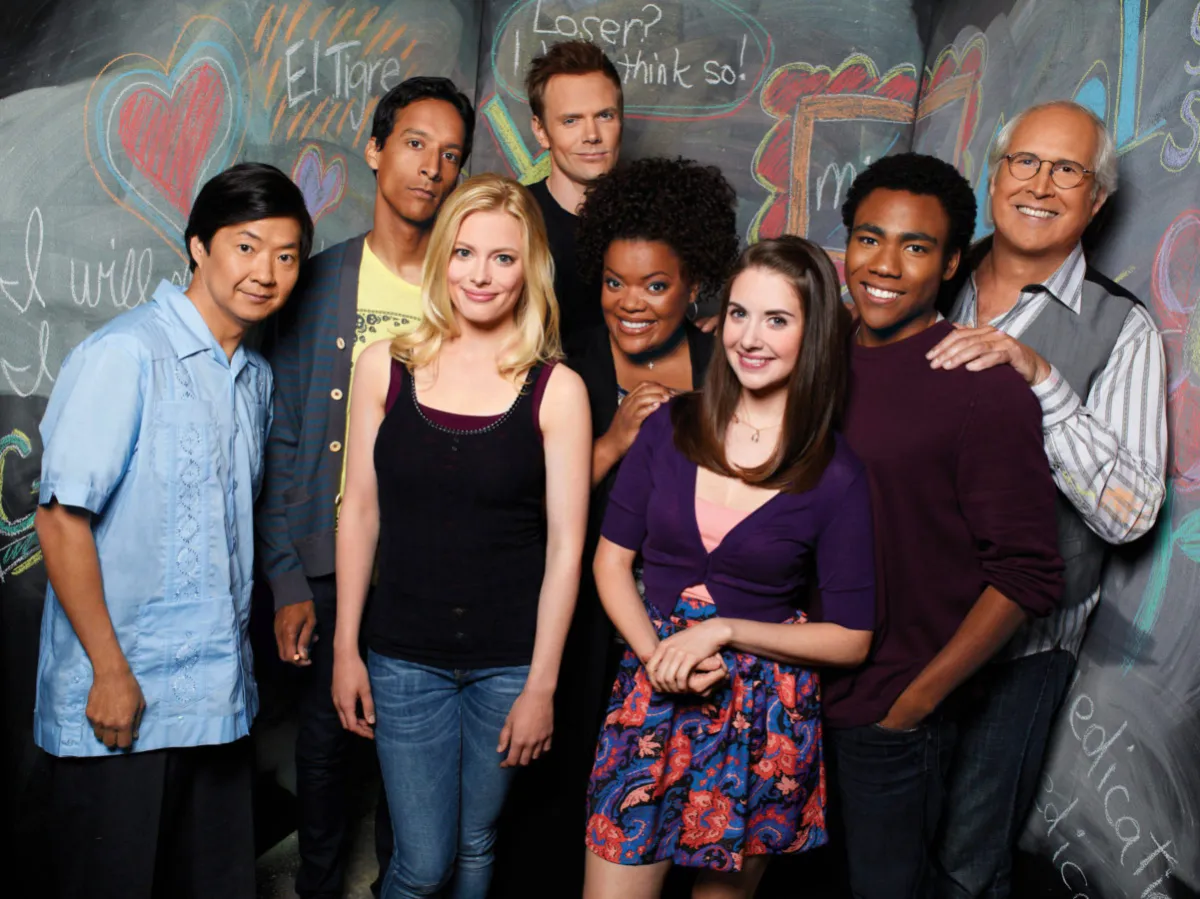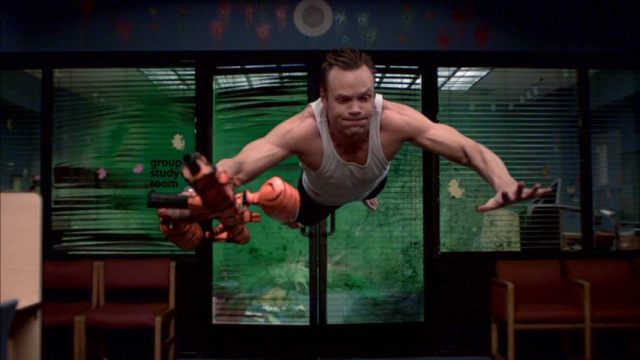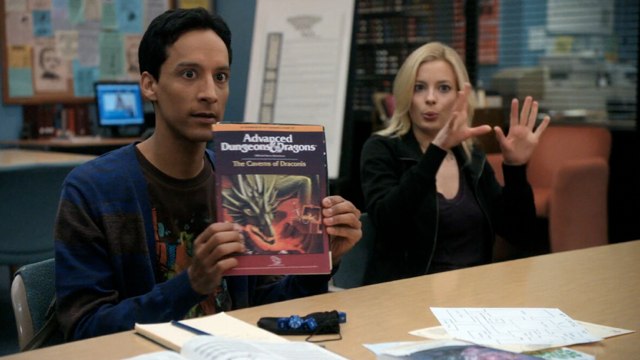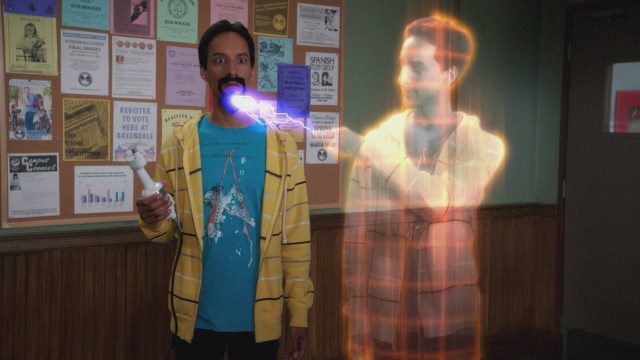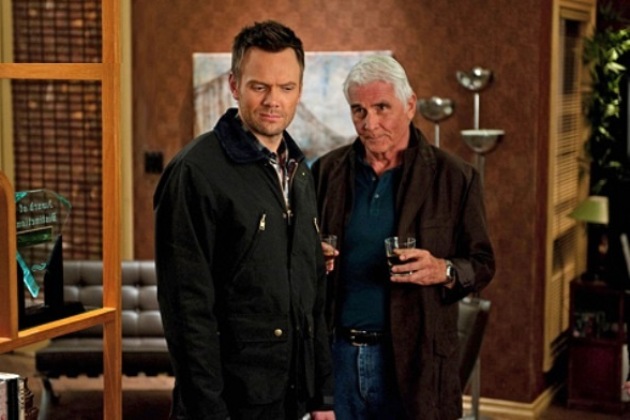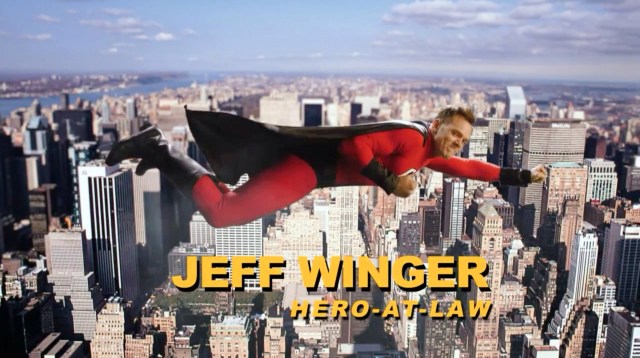Fans of Community were rewarded for their faith in the series at the end of June when Yahoo! Screen announced that it would be picking up the series after its unfortunate cancellation at the end of its fifth season. With Harmontown, the documentary following creator Dan Harmon taking his Harmontown podcast on the road, out this week in theaters and on VOD [Editor’s note: Our interview with Harmon and director Neil Berkeley is forthcoming], I thought I would take a look back at what I see as the best episode of each of season of Community. I am prepared for you to shake your head the entire time you’re reading this article, and you are more than welcome to yell at me in the comments. If you yell, that means you care. And that means more potential attention for the show!
Season 1: “Modern Warfare”
Community had me hooked with the first episode. I was already a fan of Joel McHale from his time hosting The Soup, and the mix of the cast and really smart writing made for a show that was almost unlike anything else on TV. Almost. Because as delightful as the series was, it still had the feel of Every Other Show. It dipped its toe into the waters of exploring genres—the homage to The Godfather in the episode “Contemporary American Poultry” being a prime example—but the series never dared to push into relatively unexplored territory until the episode “Modern Warfare.”
Dean Pelton has announced that the prize for the school’s Spring Fair Paintball Assassin game is priority registration, meaning that the winner can sculpt their schedules to their liking. Jeff sees this as an opportunity to graduate from Greendale Community College and get back to practicing law more quickly, while Shirley wants to use the prize to create a schedule that would afford her more time at home with her children. The members of the study group form a reluctant reliance during the game, until their numbers and the school’s other students are picked off by the Dean’s ringer, Señor Chang. Jeff and Britta have to fight past their bickering and awkward sexual tension in order to beat Chang and the Dean at their own game.
While the show had never exactly portrayed Greendale Community College as the most conventional of schools, this episode showed how far the writers were willing to go to show that anything could happen there. And while the homages to The Matrix and Die Hard were cleverly done, the episode really shines when it does what all of Community’s best genre episodes do: reveal something about the characters and move along their narrative arcs. The intensity and action of the paintball war provide an opportunity to further explore the will-they, won’t-they tale of Jeff and Britta and give it some sort of trajectory. Further, Jeff’s altruistic move in giving Shirley the prize of priority registration after winning the game shows one of his big first steps toward thinking beyond himself and hinting that maybe being able to practice law won’t always be his number one priority at Greendale.
Season 2: “Advanced Dungeons & Dragons”
I almost opted to highlight “Cooperative Calligraphy” here, as that bottle episode did a magnificent job using solely the study room as a set piece in which the characters can learn more about themselves than might have cared to know. As a character study, the “Calligraphy” was beautiful. However, “Advanced Dungeons & Dragons” shows Community at the top of its game in what it does best: employing genres and what might seem like gimmicks to tell a larger story about its characters.
Greendale student “Fat Neil” becomes depressed when the taunting he endured in high school carries over to college; case in point, he is given the moniker “Fat Neil” and is called only that by students and teachers alike. Jeff recognizes Neil’s depression and feigns interest in Neil’s love of Dungeons & Dragons in order to reach out to him. However, when Jeff and Annie sense that Neil might be on the cusp of committing suicide, they assemble the rest of the study group (and, accidentally, Chang) to create a game of D&D to make Neil feel like a winner and build his confidence. Pierce, who hadn’t been invited to the roleplaying adventure in case he acted like an ass toward Neil, catches wind of the game and pops in to wreak havoc and attempt to spoil their plans.
Although I don’t know much about D&D, I do know enough to know why some roleplaying fans bristled at how the game was played in the episode. However, the producers did as good a job as we could probably ask for in taking a roleplaying game, making it visually dynamic, and fitting it all in the 21-minute time constraints of the episode. Harmon and company also manage to take a game of D&D and attach real stakes to the outcome, so much so I was highly invested in the adventure. Further, it shows that even though the members of the study group can be highly absorbed people, caught in each other’s orbits, Jeff and the crew can assemble and get their shit together enough to reach out and attempt to save a life. (Spoiler alert: Neil’s okay.) Because, when the dust settles, that’s what a community does: it takes care of its own.
Season 3: “Introduction to Finality”
This selection was easy for me, as it is not only my favorite episode of the season, but of the entire show. I’ll be the first to admit that there may be better, more well-crafted episodes from season three. The direction and writing alone on “Remedial Chaos Theory” should have earned the episode the Emmy for which it was nominated. However, “Introduction to Finality” serves as what could have acted as the series coda had it not returned for its unfortunate Dan Harmon-less fourth season. More so than any other episode of the series, the third season finale encapsulates what Community has always been about.
First, though, some context. During “Finality,” Jeff has agreed to help defend Shirley against Pierce in campus court for the controlling interest in their joint venture of bringing a sandwich shop to Greendale. However, Jeff must contend with Alan (Rob Corddry), his old colleague who was responsible for getting Jeff disbarred and is now defending Pierce. Alan gives Jeff an ultimatum: throw the case or lose any chance of getting his old job back. Shirley tries to move Jeff to save himself and forget about her case. Instead, Jeff, in his closing argument, makes me know that, no matter how far the quality of Community could tumble like so many pillow forts, I would love it forever.
“Your honor, I have no closing statement because I’m throwing the case.
No, no, it’s okay. It’s fine, don’t worry. My client, Shirley Bennett—my friend for three years, she told me that it was okay. She said what I want is more important. She’s right… right? I mean, guys like me, we’ll tell you there’s no right or wrong, there’s no real truths, and as long as we all believe that, guys like me can never lose. Because the truth is I’m lying when I say there is no truth. The truth is… the pathetically, stupidly, inconveniently obvious truth is… helping only ourselves is bad and helping each other is good.
Now, I just wanted to get out of here, pass biology and be a lawyer again instead of helping Shirley. That was bad. And my former colleague wanted so badly to keep his rich client that he just asked me to roll over in exchange for my old job. So I guess we all walked in here pretty bad. But now, Shirley’s gone good. Shirley’s helping me.
It’s that easy. You just stop thinking about what’s good for you and start thinking about what’s good for someone else.
Then you can change the whole game with one move.
Now, if you like this idea, you can make it true by doing something good for everyone here: throw this case out of court, it’s dumb. That is all.”
Even the most causal viewers of the series know that Community isn’t merely about a bunch of misfits attending a community college, but about how a family—a community—can be formed by any group that cares for and loves one another. Beyond all of the meta-context and concerns with genre homages, the series has always been primarily interested in how these families are formed and how their members should care for them with love and respect. By the end of the episode, we see a culmination of Jeff learning that lesson, transforming from the scumbag who formed a Spanish study group in order to get closer to Britta into a man who embraces his community and shows that he has learned the meaning of love and self-sacrifice.
Season 4: “Cooperative Escapism in Familial Relations”
Among Community fans, this season is mostly remembered as The Year without a Harmon, as showrunner and creator Dan Harmon had been fired at the end of season 3. While I was apprehensive at first about season four, I genuinely wanted to give it a chance, although at times it felt like I was cheating on Harmon. And while the season had its moments, the best I can say about it is that it felt like really good Community fanfiction. It was good for what it was, but it was obviously trying too hard to be what it had been in its glory days. While not all of the Harmon-helmed episodes of the series were perfect—far from it—he had a knack for blending the crazy with characterization without letting the viewer see the seams. Season 4 was all seams. Seams everywhere. It never hit that sweet spot of mixing heart with zaniness, and it all ended up feeling like a forced mess, a shade of its former self.
That said, if I had to pick an episode from the season that was my “favorite,” it would be “Cooperative Escapism in Familial Relations.” During Thanksgiving, Abed, Troy, Annie, and Pierce celebrate the holiday with Shirley and her extended family. They don’t like Shirley’s behavior, however, and hide out in the kitchen, with some forgettable Shawkshank Redemption thrown in to, I imagine, eat up the 21 minutes of airtime that the network needed to fill. The real meat of the episode is the A-story in which Jeff meets his dad and spends the holiday with him, his half-brother, and Britta. The meeting has its high points, as James Brolin’s portrayal of William Winger makes me believe he could have fathered the study group’s de facto leader. However, the real breakthrough is made between Jeff and his half-brother, as Jeff has a glimpse of what his life could have been like if his father hadn’t left him and his mother at an early age.
Season 5: “Repilot”
With the beginning of the fifth season of Community, creator Dan Harmon was reunited with baby and back where most fans of the show thought he belonged. With a few hiccups, the series felt like its old self, which was no easy feat, as the season saw the exits of both Chevy Chase after a cameo in the first episode and Donald Glover after the fifth. With the return of Harmon as showrunner, the season hit the ground running with “Repilot,” which set the tone for the remaining episodes. The season opener focuses on Jeff’s return to being a lawyer, which has tanked in spectacular fashion, as we see repo men confiscating the trappings of his strip mall law office. Jeff has tried to put the lessons he learned at Greendale to good use, striving to help people, but life got the better of his altruism. At his lowest point, his old colleague Alan returns to enlist Jeff’s help to gather evidence for Alan’s architect client, who saw a bridge he designed recently collapse. Alan’s client is suing the school who gave him his architecture degree for negligence. The school? Yep, Greendale. When Jeff discovers the Dean destroying any evidence of the architect’s time at Greendale, he convinces his old study group, who have all moved on from Greendale to little success, to sue the school for ruining their lives.
The reason “Repilot” works so well is that it acknowledges that the members of the study group have moved on with their lives without resetting the characters to their season 1 roots. Harmon doesn’t completely ignore the events of season 4, but rather embraces them for what they’re worth and picks up the study group’s tale from where it left off. Some critics have said that, while it was great to have Harmon back, the premiere felt like the characters had taken a step back by returning to Greendale as students. I disagree with that assessment because, as Jeff says to Britta and company, it’s okay for a person to admit that he or she has more work to do on themselves.
The opener sets up a plausible character-driven reason for Jeff to stay, as well. As we see during his confrontation with Alan—where he whips him with his own necktie—Jeff hasn’t forgotten the lessons of season 3’s finale. With every thrash of the tie, Jeff says, “That’s for making me go to this school! That’s for making the last four years happen! And now I get to make them un-happen for me and the only people I care about!” So, while Jeff has learned that he needs to take care of his people, he still has much to learn about taking care of the larger community, namely Greendale. That’s why it makes sense when he decides to become a professor at Greendale: he’s helping to save the school not just by not suing it, but also by giving back to the students with what he’s learned. In the process, and in true Community fashion, he has the opportunity to learn more himself.
And, I have to admit, I cheered when Jeff took Alan’s tie and got some modicum of revenge on him.
So, Community fans, I’m sure you have your own thoughts about each season’s best episode. Heck, my opinions change daily. Let us know what you think in the comments. And be sure to check out Harmontown, now in theaters, on iTunes, and on VOD.
Jed W. Harris-Keith is a pop culture junkie but insists that he can stop whenever he wants. His spirit animals are Jim Halpert from The Office and Jeff Winger from Community. He usually stays busy making squiggles into words over at FreakSugar and by working as an educational writer. You can also catch him on the Twitter @jwkeith80 and on Tumblr at therunningdude.tumblr.com. He currently lives in Camarillo, California, with his wife and their two bassets, Otto and Igor.
- Oh, That’s (Not) Nice: Yvette Nicole Brown Leaves Community
- Community Season 6 Teaser Says Yahoo Can Rebuild It Better Than Ever, They Have the Technology
- Recaps from the Brightest Timeline
Are you following The Mary Sue on Twitter, Facebook, Tumblr, Pinterest, & Google +?



